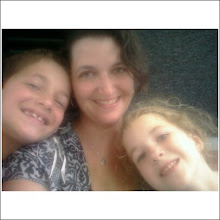Yeterday my Aunt Donna drove us home from Houston and I think she was a little blown away with how normal and happy and totally fine Rachael is feeling. I had to call my boss a couple days ago and Rachael was near me and giggling and generally being disruptive but my boss said a couple times that it was so wonderful to hear her laughing voice.
What is strange? Is it strange that people are surprised by her ability to quickly put the bad behind her or is it strange that I feel something like pressure to be somber along with those concerned? It's weird. I appreciate the concern! Covet it even. I LOVE that people are interested and want to know and I don't want anyone to stop asking but the surprise sometimes looks like disbelief. I am truly no longer in denial but when things are good, they are good and this is a good week. Last week... not so much but last week is gone.
It's different with kids. Everyone says that and I see it firsthand everyday that she is not affected by the stress of her situation the way the adults around her are. My parent's-in-law showed me a passage out of the book "My STROKE of INSIGHT", by Jill Bolte Taylor, Ph.D. It sums up what I'm trying to say perfectly.
"It's important we realize that we are capable of feeling physical pain without hooking into the emotional loop of suffering. I am reminded of how courageous little children can be when they become extremely ill. Their parents may hook into the emotional circuitry of suffering and fear, while the child seems to be adapting to the illness without the same negative emotional drama. To experience pain may not be a choice, but to suffer is a cognitive decision. When children are ill, it is often more difficult for the child to handle parental grief than it is for the child to endure the illness."Rachael absolutely has had some really painful things happen to her and there is more pain to come as our year of interferon approaches but she does not suffer. I pray that does not change.
Tomorrow night I'm headed back to Houston for an appointment with her oncologist on Thursday. I'm nervous because supposedly they should have the path results back from her lymph nodes and historically (like the one other time) when they don't call ahead of time it's because the news isn't great. Maybe they don't have the results back or maybe they just got busy and forgot to call or maybe they didn't think good results would be any sort of surprise so they just figured they would wait until I got there. This time though I'm coming prepared and bringing one of my best friends with me and our hope is that it will be an unevenful trip and we can just have fun.
And when we get back and people ask how Rachael is doing we will say, "She's doing great!"


Hey Didi,
ReplyDeleteI want you to know I think of you and how Rachael is doing often. I am praying for you all the time and i miss you. I know this is a difficult time in your lives and perhaps somewhat numbing but you all are very loved. and i know God is seeing you through. let me know when Rach is ready for another play date. *hugs* ~anna
YEA! It is amazing how children can do that...separate things so nicely. Amazing and wonderful. :0)
ReplyDelete~robin
Praying for you tonight, friend. Pam Teel
ReplyDeleteChildren are so resilient. They are amazing to watch. I'm glad she's doing well.
ReplyDeleteI'll be thinking of you as you head to Houston!
You know, that's one of the 4 Noble Truths of Buddhism, that suffering is optional. I really like this quote from Sylvia Boorstein, who has some great books for westerners on Buddhism.
ReplyDelete"I've discovered there are only two modes of the heart. We can struggle, or we can surrender. Surrender is a frightening word for some people, because it might be interpreted as passivity, or timidity. Surrender means wisely accommodating ourselves to what is beyond our control. Getting old, getting sick, dying, losing what is dear to us, what the Buddha taught as the first Noble Truth or life's unsatisfactoriness-- is beyond our control. I can either be frightened of life and mad at life-- or not. I can be disappointed and still not be mad. Stopping being and-- when I can,-- translates, for me as being compassionate-- to myself as well as to other people."